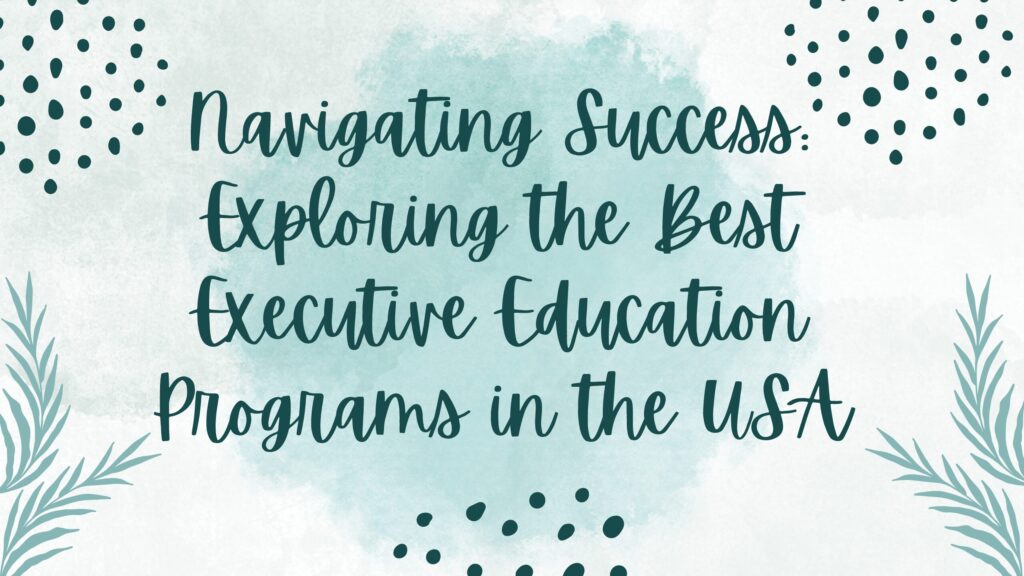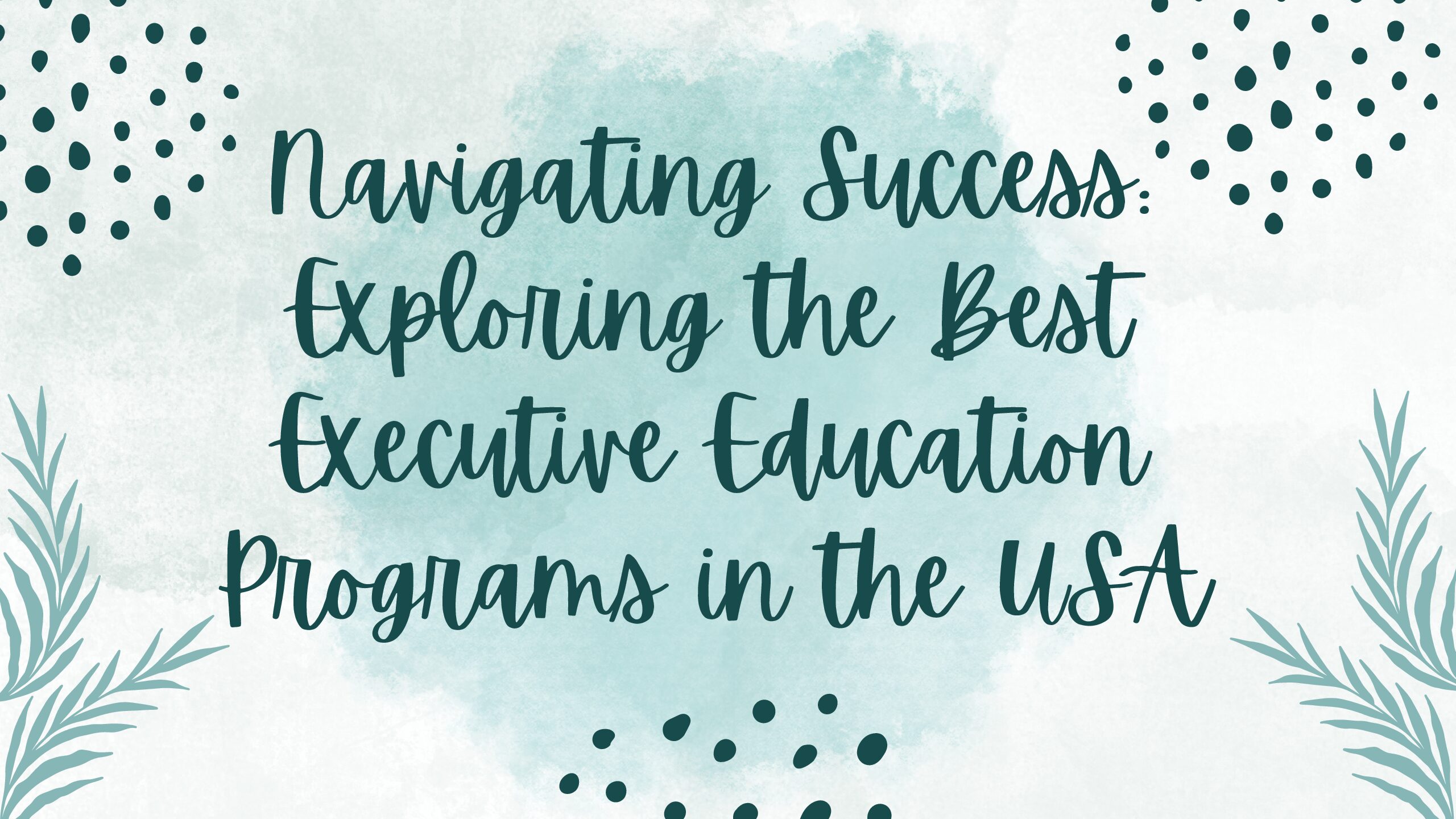Introduction best executive education programs in usa:
In the dynamic landscape of professional development, executive education programs stand out as transformative avenues for career advancement. As the global market evolves and competition intensifies, executives seek specialized knowledge and skills to navigate complexities and drive organizational success. In the United States, renowned for its innovation and leadership across industries, an array of executive education programs beckon aspirants with promises of unparalleled growth and learning. This comprehensive guide delves into the realm of executive education, uncovering the best programs across the USA and shedding light on what makes them exceptional.
Understanding Executive Education:
Executive education programs cater to seasoned professionals, offering targeted learning experiences to enhance leadership capabilities, strategic thinking, and managerial acumen. These programs differ from traditional academic pursuits, focusing on practical insights, real-world challenges, and peer collaboration. Executives, ranging from middle management to C-suite executives, embark on this educational journey to acquire cutting-edge knowledge, expand their networks, and stay abreast of industry trends.
Criteria for Evaluating Executive Education Programs:
Selecting the right executive education program is pivotal for maximizing returns on investment and achieving personal and organizational objectives. Several key factors warrant consideration:
- Reputation and Accreditation: A program’s reputation and accreditation reflect its academic rigor, faculty expertise, and industry relevance. Accredited programs adhere to rigorous standards, ensuring quality and credibility.
- Curriculum and Specialization: The curriculum should align with participants’ professional goals and organizational needs, offering a blend of theoretical frameworks and practical insights. Specialized tracks cater to diverse industries and functional areas, catering to the specific requirements of participants.
- Faculty Expertise and Pedagogy: Esteemed faculty members bring a wealth of experience and expertise to the classroom, fostering an enriching learning environment. The pedagogical approach, encompassing case studies, simulations, and experiential learning, enhances engagement and knowledge retention.
- Alumni Network and Industry Connections: A robust alumni network facilitates lifelong learning and professional growth, enabling participants to leverage peer support and mentorship opportunities. Strong ties with industry partners provide access to guest speakers, executive forums, and networking events.
- Learning Format and Flexibility: Executive education programs offer various formats, including short courses, certificates, and custom programs, catering to diverse schedules and learning preferences. Flexibility in delivery modes, such as on-campus, online, or blended formats, accommodates participants’ professional commitments.

Top Executive Education Programs in the USA:
The United States boasts a plethora of renowned institutions offering world-class executive education programs. While the rankings may vary based on different criteria and methodologies, several programs consistently stand out for their excellence:
- Harvard Business School Executive Education (Boston, Massachusetts):
Harvard Business School’s executive education programs are synonymous with academic excellence, innovation, and impact. With a rich legacy of thought leadership and transformative learning experiences, Harvard offers a diverse portfolio of programs catering to executives at every career stage. - Wharton Executive Education, University of Pennsylvania (Philadelphia, Pennsylvania):
Wharton School’s executive education programs combine cutting-edge research with practical insights, equipping executives with the tools to lead with confidence and agility. From leadership development to finance and strategy, Wharton offers a wide range of programs tailored to diverse industries and functions. - Stanford Graduate School of Business Executive Education (Stanford, California):
Stanford GSB’s executive education programs blend academic rigor with Silicon Valley’s entrepreneurial spirit, fostering innovation and strategic thinking. With a focus on design thinking, digital transformation, and global leadership, Stanford’s programs empower executives to drive change and create value in a rapidly evolving world. - MIT Sloan Executive Education (Cambridge, Massachusetts):
MIT Sloan’s executive education programs leverage MIT’s renowned expertise in technology, innovation, and entrepreneurship to address complex challenges facing executives today. With a strong emphasis on data-driven decision-making and digital transformation, MIT Sloan equips executives with the skills to thrive in a technology-driven economy. - Kellogg Executive Education, Northwestern University (Evanston, Illinois):
Kellogg School of Management’s executive education programs blend academic rigor with practical relevance, empowering executives to lead with vision and impact. From marketing strategy to negotiations and innovation, Kellogg offers a diverse portfolio of programs designed to accelerate career growth and organizational success.
Conclusion:
Executive education programs play a pivotal role in shaping the future of leadership and driving organizational excellence. In the competitive landscape of executive education, institutions across the USA set the standard for academic rigor, innovation, and impact. By carefully evaluating key criteria and exploring top programs, executives can embark on a transformative learning journey that propels their careers and transforms their organizations. Whether at Harvard, Wharton, Stanford, MIT Sloan, or Kellogg, the pursuit of executive education promises boundless opportunities for growth, learning, and success in the dynamic world of business.
